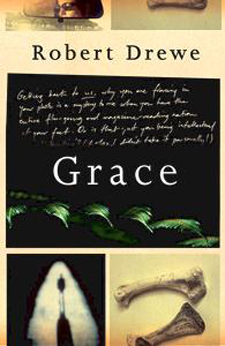The novels of Robert Drewe are peopled by men and women ill at ease with their environs. His characters are often searching for or escaping from something. But Drewe is rarely content to focus solely on the individual; grander themes of social responsibility and morality are usually at work behind the human drama. His novel Grace is no exception. Ostensibly a thriller " a woman on the run from a stalker " the surface narrative is imbued with reflections on the way our society treats refugees.
Grace Molloy is a 29-year-old writer, a film reviewer with a glossy magazine, who learns that the melodramas of the silver screen are not solely fictitious. Attracting the unwelcome attentions of a fan, she finds herself the victim of a stalker. As those around her dismiss his attentions or blame her for the situation, his affections become more pronounced and more dangerous. Losing her job and abandoned by her lover, Grace eventually takes flight, seeking refuge in a remote community in the Kimberley.
Working at a wildlife park she reinvents herself as an independent and self-sufficient woman. However her existence is once again rocked by the arrival of two men. One " still a boy really " is an escapee from a detention centre. The other is her persistent stalker.
The boy " as he is known " is one of a few survivors from a disaster at sea. After being promised safe and comfortable passage, a boatload of men, women and children seeking asylum and refuge were crowded onto a barely functioning craft in Indonesia. Forced at gunpoint to continue the journey the refugees survived briefly at sea before the ship sunk taking with it most of the passengers and crew. The boy lived.
Having lost his homeland, his family and his freedom, the boy begins to lose his very self.

As Grace's story in the present unfolds the novel delves into the past. Grace was named after an ancient skeleton discovered by her anthropologist father, John Molloy.
Known as the first modern woman, Grace (the skeleton) had the potential to rewrite history. In between his daughter's story, we learn of John's life from his orphanage upbringing through to his failed relationship with Grace's mother.
Drewe is an elegant crafter of prose and an accomplished storyteller, yet the early chapters of Grace bear little resemblance to his best work. His descriptions of Grace's work and her encounters with her mother read like barely digested research. Perhaps it is the male versus female perspective? His writing is much stronger when he is focused on John Molloy.
After a shuddery start the novel becomes more assured and more compelling despite a few moral quandaries along the way.
So what is it about? Not "grace' as Christians would understand it. Grace Molloy's name refers to her elegance and poise " her physical grace. But perhaps Drewe is comparing Grace's form with the lack of grace shown to those seeking sanctuary.
The novel is scathing about the way Australia deals with refugees. From the official response to an eerily familiar disaster at sea, to the inhumanity of the detention centres, the government (and by implication Australians) is depicted as both culpable and callous.
Protestant Christians " particularly creationists " are either the object of scorn or dangerously wacky. Perhaps it is true of a stalker's profile " to cloak one's threats in religious language. Grace's stalker, an erotomaniac, invokes Jesus and all manner of Biblical texts to justify his aberrant behaviour. His avid religiosity mixed with his antisocial attitudes is in keeping with the novel's disdain for Protestant Christianity.
Drewe has more time for the Catholics. It is they who are prepared to engage in civil disobedience for the sake of humanity. It is they who shelter and hide the "illegals" who might have slipped through the government's net.




























